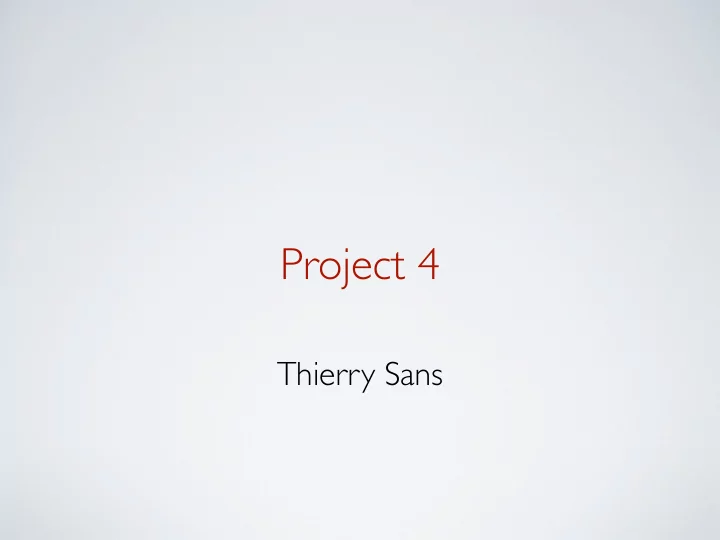

Project 4 Thierry Sans
Overview Build on top of project 2 or project 3 • Up to 5% extra credit if you enable VM • Edit ‘filesys/Make.vars’ to enable VM Remove the severe limitations of the basic file system • No internal synchronization • File size is fixed at creation time • File data is allocated on contiguous range of disk sectors • No subdirectory
Scope of the work Makefile.build | 5 devices/timer.c | 42 ++ filesys/Make.vars | 6 filesys/cache.c | 473 +++++++++++++++++++++++++ filesys/cache.h | 23 + filesys/directory.c | 99 ++++- filesys/directory.h | 3 filesys/file.c | 4 filesys/filesys.c | 194 +++++++++- filesys/filesys.h | 5 filesys/free-map.c | 45 +- filesys/free-map.h | 4 filesys/fsutil.c | 8 filesys/inode.c | 444 ++++++++++++++++++----- filesys/inode.h | 11 threads/init.c | 5 threads/interrupt.c | 2 threads/thread.c | 32 + threads/thread.h | 38 +- userprog/exception.c | 12 userprog/pagedir.c | 10 userprog/process.c | 332 +++++++++++++---- userprog/syscall.c | 582 ++++++++++++++++++++++++++++++- userprog/syscall.h | 1 vm/frame.c | 161 ++++++++ vm/frame.h | 23 + vm/page.c | 297 +++++++++++++++ vm/page.h | 50 ++ vm/swap.c | 85 ++++ vm/swap.h | 11 30 files changed, 2721 insertions(+), 286 deletions(-)
Requirements • Buffer Cache • Indexed and Extensible Files • Subdirectories • Synchronization
Buffer Cache Modify the file system to keep a cache of file blocks • Reduce expensive disk I/O • No more than 64 sectors (including inode and file data)! 64 x 512 bytes = 4 Kb = 1 page Get rid of the "bounce buffer" in inode_{read,write}_at() • Used to implement read/write in byte-granularity • Interact with the buffer cache instead Cache replacement algorithm • Must be at least as good as the “clock” algorithm • Maybe give higher priorities to metadata (i.e., inode) over file data?
Buffer Cache Your cache should be write-behind • Keep dirty blocks in cache • Write to disk on cache eviction or file closing • Periodically (30 sec) write dirty blocks back to disk • Don’t forget to flush when Pintos halts (in filesys_done() ) Your cache should also be read-ahead • Prefetch the next block of a file when one block of file is read • Only meaningful when done asynchronously, in the background
Remove inode_disk from inode
Indexed and Extensible Files The basic file system suffers from external fragmentation • Always allocates files as a single extent • Dictated by the current representation of an inode
Indexed and Extensible Files Modify struct inode_disk to use an index structure Use a combination of direct, indirect, and doubly indirect blocks • Support file size up to 8MB •
Indexed and Extensible Files Support file growth • There should be no predetermined limit on the size of a file • File size starts as 0; expanded every time user writes beyond EOF ✓ Details in Section 6.3.2 Directory can grow too • remove the 16-file limit in the root directory • dir_create(ROOT_DIR_SECTOR, 16) in filesys.c:do_format(void) Use the "free map" ( free-map.c ) to keep track of free disk sectors • Hard-coded to be kept at disk sector 0 (i.e., #define FREE_MAP_SECTOR 0 ) • You can keep a cached copy permanently in memory
Subdirectories Implement a hierarchical name space • e.g. /foo/bar/../baz/./a • Directory entries (i.e. struct dir_entry ) can point to files or other directories Each process has its own current directory • Set to the root directory at startup • Inherited by the child process started by the exec system call Implement path resolution • Update existing syscalls to take path names (absolute or relative) as inputs • Support special file names . and ..
Subdirectories Update existing system calls • Update open to open directories • Update remove to delete empty directories • … ✓ Many more details in section 6.3.3 More system calls • Implement chdir , mkdir , readdir , isdir , and inumber • User programs ls , mkdir , and pwd should work now
Synchronization No more global file system lock • Operations on different buffer cache blocks must be independent • e.g. process A can read cache block 3 while process B is replacing block 7 Multiple processes must be able to access the same file concurrently • When the file size is fixed - read can see partial change; writes can interleave • But extending a file and writing data into the new section must be atomic Operations on the same directory must be serialized • Operations on different directories are independent ✓ Recall the readers/writers problems from lecture 4 "Concurrency Problems"
Getting Started New code to work with • directory.c performs directory operations using inodes • inode.c data structures representing the layout of a file’s data on disk • file.c translates file reads and writes to disk sector reads and writes ✓ Details in Section 6.1.1 Testing file system persistence • Invoke Pintos a second time to copy files out of the Pintos file system • Grading scripts check if the contents of the file meet expectation • Won’t pass the extended file system tests until you support tar ✓ Details in Section 6.1.2
Suggested Order of Implementation ➡ Think about synchronization from the beginning 1. Buffer cache • All tests from project 2 (or project 3) should still pass 2. Extensible files • Pass the file growth tests 3. Subdirectories • Pass the directory tests ✓ #2 and #3 can be done more or less in parallel
Acknowledgments Some of the course materials and projects are from • Ryan Huang - teaching CS 318 at John Hopkins University • David Mazière - teaching CS 140 at Stanford
Recommend
More recommend